Content
- 1 Chemical composition and nutritional value
- 2 What is useful and what helps the rosehip root for the human body
- 3 How to brew and drink rosehip root properly
- 4 Rosehip roots in folk medicine
- 4.1 Rosehip root recipe for dissolving kidney stones
- 4.2 Rosehip root for gallstones
- 4.3 Rosehip root for prostate stones
- 4.4 Rosehip roots for prostatitis
- 4.5 Rosehip roots for the treatment of cystitis in men
- 4.6 Rosehip root for pancreatic disease
- 4.7 Rosehip roots to strengthen immunity
- 4.8 Rosehip roots from hepatitis
- 4.9 Rosehip root for hypertension
- 4.10 Rosehip roots from fungus
- 4.11 Rosehip roots with uterine bleeding
- 5 Contraindications
- 6 When digging and collecting rosehip root
- 7 How to properly harvest rosehip root
- 8 Conclusion
- 9 Reviews of doctors on the treatment of kidney stones with rosehip root
The medicinal properties of rosehip root and contraindications are of high importance in folk medicine. Infusions and decoctions can help with many ailments, if used correctly.
Chemical composition and nutritional value
Not only wild rose berries, but also rhizomes have medicinal value. They include:
- potassium and manganese;
- beta carotene;
- thiamine and riboflavin;
- magnesium and phosphorus;
- retinol;
- vitamin C;
- rutin;
- vitamin E;
- pectins;
- tannins;
- essential oils;
- antioxidants.
It is necessary to consume rosehip root for diseases in limited quantities, since it also contains glycosides and alkaloids that can potentially be harmful. But when following proven recipes, medicinal raw materials will have a beneficial effect on the body.
What is useful and what helps the rosehip root for the human body
The rich chemical composition gives the plant raw materials numerous healing properties. Specifically, rosehip root:
- strengthens the immune system and makes the body more resistant to viruses and colds;
- helps to fight inflammatory processes;
- has an antibacterial effect;
- evens out blood pressure and strengthens blood vessels;
- has a positive effect on the genitourinary system;
- helps to remove salts, toxins and toxins from the body;
- helps to strengthen muscles and bones;
- prevents the development of heart disease;
- improves metabolism and lowers sugar levels;
- serves as an antipyretic agent for colds.
Infusions based on medicinal raw materials are used for external treatment and early healing of wounds and cuts.
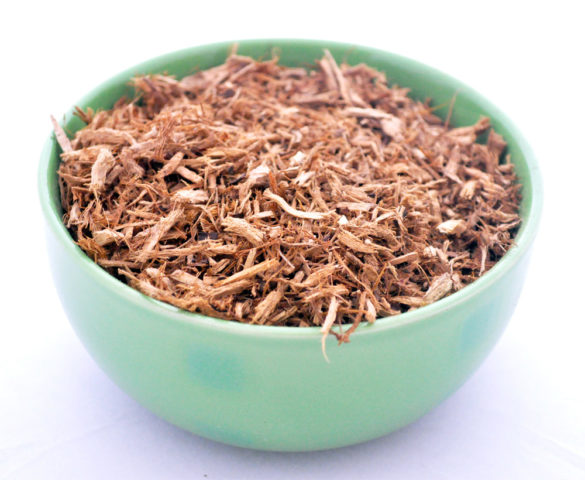
For women
Infusions and decoctions based on the root improve the condition of a woman during menstruation and help to cope with heavy bleeding. Rosehip drinks contribute to weight loss, level the emotional background and replenish energy reserves. During pregnancy, the root helps protect against viruses and colds, and also prevents the development of anemia and vitamin deficiency.
For men
The healing properties of rosehip root are used in the preparation of tinctures and decoctions that improve male potency.Herbal raw materials are of great benefit in the treatment of prostatitis and inflammation of the urinary tract. Consuming root drinks wisely helps men protect themselves from developing cardiovascular diseases and reduce the risk of heart attacks and strokes.
How to brew and drink rosehip root properly
Traditional medicine offers several effective medicinal drinks from the plant root. Basically, rose hips are used to prepare water decoctions, but alcohol products also have a good effect.
How to make a tincture
Useful substances in the composition of rosehip rhizomes dissolve especially well in an alcohol base. The following tincture recipe is popular:
- 50 g of chopped rosehip root and 10 g of citrus peel are mixed in a glass container;
- add a pinch of ground coffee;
- pour a mixture of 500 ml of vodka;
- shake up and put in a dark place for two weeks.
After the expiration date, the contents of the container are filtered, and then a large spoonful of simple sugar syrup is added to the tincture. The product is again poured into the bottle and insisted for another three days.
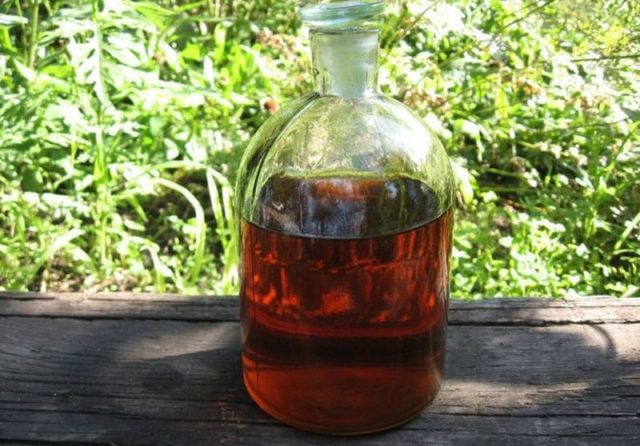
How to brew rosehip root tea
Rosehip root tea has strong immunomodulatory properties. It brings particular benefits in the autumn-winter period. You can prepare a drink according to this recipe:
- rosehip root is ground in a blender to a powder state;
- fall asleep in a teapot scalded with boiling water and add three mint leaves;
- pour 500 ml of boiling water and insist for seven minutes.
It is allowed to put a spoonful of natural honey in tea just before drinking.

How to prepare and take a rosehip root decoction
A decoction based on rhizomes has a high concentration of nutrients and is especially often used to treat inflammatory processes. It's pretty simple to prepare it:
- a small dried root is cut into pieces of 2-3 mm;
- pour 500 ml of cold water;
- boil over low heat for ten minutes after boiling;
- pour the hot product into a thermos and insist for another quarter of an hour.
Then the drink needs to be slightly cooled and filtered through cheesecloth. Drink the broth in accordance with a specific recipe.
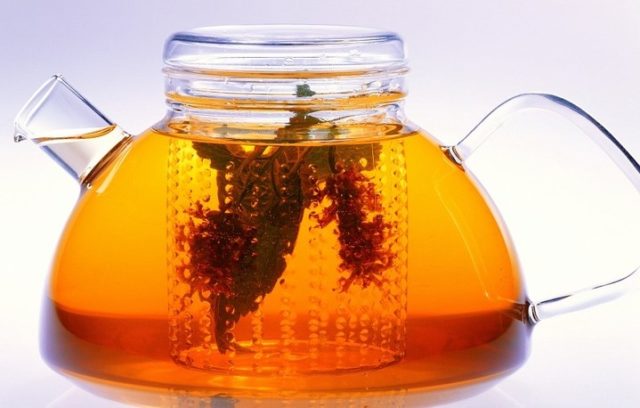
Healing baths
Rosehip root is beneficial when applied topically. A decoction based on it can be added to hot baths. The remedy is made as follows:
- two large tablespoons of finely chopped root pour 1 liter of boiling water;
- boil over low heat for three hours;
- insist under the lid for another hour and filter.
The instruction for the rosehip root recommends diluting the prepared broth with clean water in a 1: 1 ratio and immersing your feet in it for about 20 minutes. In this case, the liquid should not be scalding, but simply moderately hot. For a full bath, you need to prepare 3 liters of broth and pour it into a filled container.
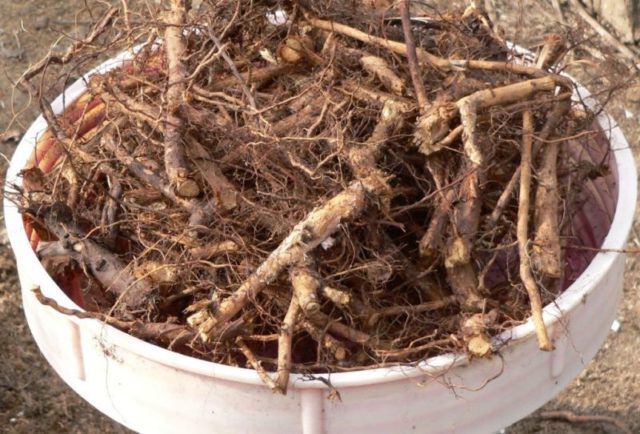
Rosehip roots in folk medicine
Mainly wild rose rhizomes are taken to treat inflammatory ailments and remove stones. Traditional medicine offers several effective and safe regimens.
Rosehip root recipe for dissolving kidney stones
Rosehip root heals kidney stones, provided they are small in size. The broth is done like this:
- two large spoons of crushed rhizomes are poured with 500 ml of water;
- boil the product for 15 minutes and remove from the stove;
- cover with a lid and incubate for another 1.5 hours.
Filter the finished broth and take 80 ml on an empty stomach three times a day. You need to continue the course for 14 days in a row, it is especially useful to combine the remedy with diuretics.
Rosehip root for gallstones
The beneficial properties of black rosehip root, as well as red, are expressed in the fact that it brings relief from gallstones. Usually such a decoction is prepared:
- 20 g of finely chopped root pour 250 ml of boiling water;
- boil over low heat for about 20 minutes;
- insist closed for another two hours.
When the broth cools down a little, it is filtered and taken in 150 ml three times a day. The treatment is continued for two weeks, then they take a break for ten days. Small stones dissolve after several courses of taking the drug. With large stones, the rosehip root is still contraindicated, since it is undesirable and dangerous to move them without medical supervision.
Rosehip root for prostate stones
With advanced prostatitis in men over 45 years old, hard salt deposits may appear in the prostate gland. They provoke inflammation and severe pain. In the initial stages of the development of pathology, a recipe for decoction of rosehip root from calcifications in the prostate is beneficial. They do it like this:
- two large spoons of crushed raw materials are poured into 400 ml of hot liquid;
- in a water bath, the agent is heated for five minutes.
The cooled and filtered broth is drunk 70 ml on an empty stomach only once a day. You need to take the remedy with the permission of the doctor and with small stones.
Rosehip roots for prostatitis
Rosehip rhizomes help prevent the transition of prostatitis to severe stages, remedies based on them relieve inflammation well. Traditional medicine suggests preparing the following drink:
- three large spoons of dry, finely chopped roots pour 300 ml of water;
- boil for five minutes;
- cool and filter through cheesecloth;
- topped up to the initial volume with clean drinking water.
You need to take the product on an empty stomach, 70 ml each time before meals. The treatment is continued for up to six months.

Rosehip roots for the treatment of cystitis in men
Rosehip roots have strong anti-inflammatory properties and are good for bladder inflammation. Prepare the medicine like this:
- dry rhizomes are ground into powder;
- four large spoons of raw materials pour 500 ml of water;
- for a couple, the product is kept for about 20 minutes;
- the cooled broth is filtered through cheesecloth.
Rosehip roots for urolithiasis and cystitis are drunk three times a day on an empty stomach, the treatment is continued for a month. The main symptoms go away already in the first days, but it is necessary to continue using the medicine to completely remove the inflammatory process and eliminate microbes.
Rosehip root for pancreatic disease
Rosehip rhizomes help improve the condition of the pancreas in chronic pancreatitis. The drug is prepared as follows:
- three large spoons of chopped roots pour 1 liter of boiling water;
- insist for three hours;
- dilute the finished product with water in equal proportions.
You need to drink the infusion three times a day, 70 ml. Rosehip root with pancreatitis helps well in the remission phase and avoids another exacerbation. But with increased pain and severe inflammation, you cannot take a natural remedy, the active components in its composition will only damage the irritated pancreas.
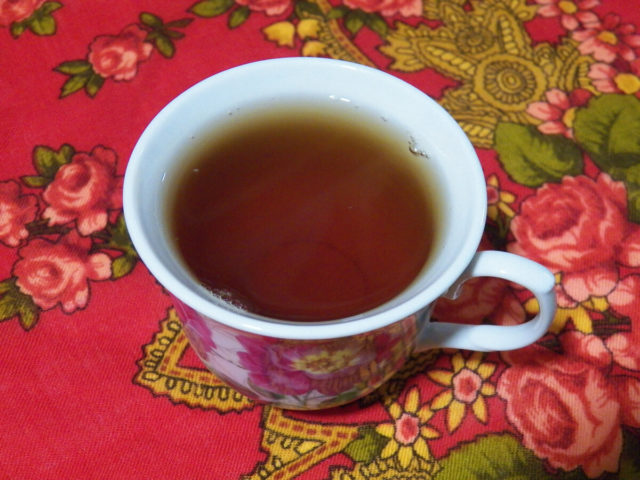
Rosehip roots to strengthen immunity
During the period of viruses and colds, it is useful to regularly consume tea based on plant roots. It is made according to the following recipe:
- a small amount of the product is ground in a blender to a homogeneous powder;
- measure out a small spoonful of raw materials and pour 300 ml of hot water.
Rosehip is brewed, like regular tea, for about seven minutes. Just before drinking, you can add a spoonful of honey or put a few dried berries to the drink. Additional ingredients will increase the benefits and improve the taste.
Rosehip roots from hepatitis
Decoctions and infusions based on rosehip rhizomes cleanse the body of toxins, reduce the load on the liver and help relieve inflammation in chronic or viral hepatitis. The following recipe is popular:
- three small spoons of rhizome powder are poured into a glass of water;
- mix;
- boil for 15 minutes over low heat;
- removed from the stove and kept under the lid for another half hour.
The total amount of the broth is divided into equal portions and taken in the morning on an empty stomach and in the evening before bedtime. The treatment is continued for two months, after which they take a break for another 30 days.
Rosehip root for hypertension
Plant rhizomes have a hypotensive effect and can lower blood pressure. With hypertension, such a remedy is beneficial:
- a large spoonful of dry powder from the roots is poured with 500 ml of water;
- raw materials are boiled on fire for seven minutes;
- removed from the stove and kept for another 3 hours under the lid.

You need to take the broth warm three times a day, dividing the total amount into equal portions.
Rosehip roots from fungus
For skin or nail fungus, infusion of rhizomes is used for treatment. Prepare the medicine as follows:
- 20 g of dried crushed raw materials are poured into 300 ml of liquid;
- boil for 20 minutes;
- passed through cheesecloth, and then insisted for another eight hours in a dark place.
You need to drink 50 ml on an empty stomach shortly before a meal.
Rosehip roots with uterine bleeding
For gynecological disorders, traditional medicine suggests preparing such a remedy:
- two large spoons of rhizomes are poured with 500 ml of warm water;
- after boiling, boil for another quarter of an hour;
- a hot container is wrapped in a thick towel and the broth is infused for three hours.
The finished drink is filtered and taken three times a day, 150 ml each. It is possible to carry out treatment with rosehip roots only under the supervision of a doctor and against the background of taking medications, since severe blood loss is a serious danger.
Contraindications
The beneficial properties and contraindications of rosehip root accompany each other. Broths and infusions based on raw materials cannot be used when:
- hypersensitivity and individual allergies;
- thrombophlebitis;
- inflammatory diseases of the cardiovascular system.
Since toxic substances are present in small volumes in the rhizomes of the plant, medicinal drinks must be taken strictly in accordance with the recipes. Do not use rosehip infusions for too long, chronic overdose leads to hypervitaminosis and harms the state of health.
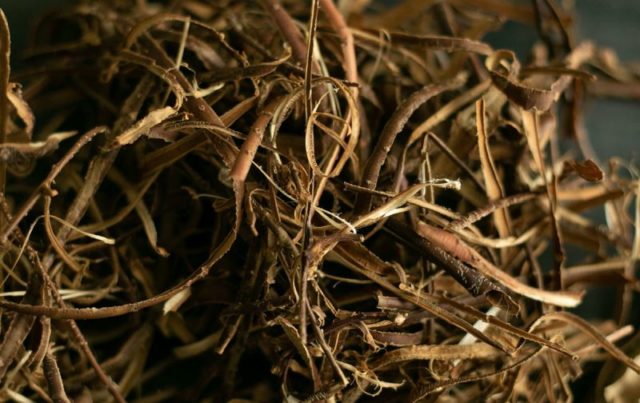
When digging and collecting rosehip root
The benefits and harms of tea from rosehip roots and decoctions depend on the time of collection. It is necessary to dig up medicinal raw materials in early spring or shortly before autumn frosts. The collection is carried out as follows - one shoot is carefully separated from the bush and removed from the ground, after which the lateral feeding roots are cut off from the main rod. They are used for medicinal purposes, since the concentration of valuable substances in such processes is the highest.
How to properly harvest rosehip root
The collected raw materials are thoroughly washed from the ground, and then cut into small pieces with a sharp knife.To prepare rosehip roots, you need to spread them on a baking sheet in a thin layer, and then leave them in a shaded place with good ventilation for several hours. When the workpieces lose a little moisture and dry up, they can be placed in the oven at 40-50 ° C.
Medicinal raw materials, ready for storage, are laid out in paper bags or linen bags and sent to a dry place away from sunlight. Roots can retain valuable properties for up to two years.
Conclusion
The medicinal properties of rosehip root and contraindications should be carefully studied before using home remedies. Natural raw materials are good for inflammation and stones in the body, but require careful handling and adherence to dosages.
Reviews of doctors on the treatment of kidney stones with rosehip root

